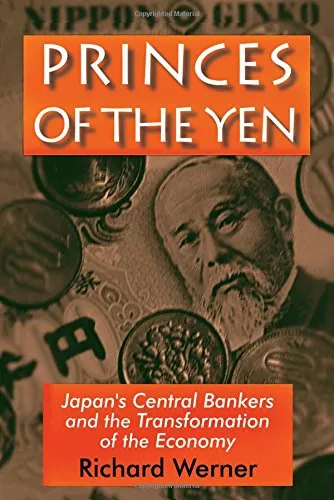Princes of the Yen : Japan's central bankers and the transformation of the economy
4.5
بر اساس نظر کاربران

شما میتونید سوالاتتون در باره کتاب رو از هوش مصنوعیش بعد از ورود بپرسید
هر دانلود یا پرسش از هوش مصنوعی 2 امتیاز لازم دارد، برای بدست آوردن امتیاز رایگان، به صفحه ی راهنمای امتیازات سر بزنید و یک سری کار ارزشمند انجام بدینکتاب های مرتبط:
خلاصهای جامع از کتاب
کتاب "Princes of the Yen : Japan's Central Bankers and the Transformation of the Economy" نوشته ریچارد ورنر به بررسی سیاستهای مالی و اقتصادی در ژاپن میپردازد. این کتاب تحولاتی را که در دهههای اخیر توسط بانک مرکزی ژاپن در اقتصاد این کشور صورت گرفته است، بررسی میکند.
ورنر در این کتاب روایتی جامع از نقشی که بانک مرکزی ژاپن در تغییرات اقتصادی ایفا کرده است، ارائه میکند و به تحلیل فرآیندهایی میپردازد که منجر به بروز بحرانهای اقتصادی در ژاپن شدهاند. او از نگاهی آگاه، سیاستها و استراتژیهایی را که مقامات پولی به کار گرفتهاند تا به اهداف اقتصادی خاصی دست یابند، مورد بحث قرار میدهد.
نکات کلیدی کتاب
- بانک مرکزی ژاپن چگونه از سیاستهای پولی برای کنترل و هدایت اقتصاد استفاده کرده است.
- نقش بانکداران مرکزی در هدایت بحرانهای اقتصادی و تغییرات ساختاری در اقتصاد ژاپن.
- چگونه تصمیمات نادرست بانک مرکزی ژاپن میتواند در درازمدت به بحرانهای اقتصادی منجر شود.
- بررسی دقیق این که چگونه قدرت متمرکز میتواند در نظامهای اقتصادی نقش فزایندهای داشته باشد.
جملات معروف از کتاب
قدرت واقعی بانک مرکزی نه در توانایی کنترل نرخ بهره بلکه در امکان تغییر مسیر جریان مالی در اقتصاد نهفته است.
بانکداران مرکزی نه تنها سیاستگذاران اقتصادی بلکه امپراتوران واقعی در عرصه اقتصادی یک کشور هستند.
چرا این کتاب مهم است
این کتاب برای کسانی که به مطالعه اقتصاد کلان و سیاستهای پولی علاقهمند هستند بسیار حائز اهمیت است. ورنر با نگرشی دقیق و تحلیلگرانه، نقشی که بانکهای مرکزی میتوانند در هدایت اقتصاد داشته باشند را روشن میسازد. همچنین، او به این میپردازد که چگونه میتوان با استفاده از درسهایی که از اقتصاد ژاپن گرفته شده است، از بحرانهای مشابه در دیگر اقتصادهای جهانی جلوگیری کرد.
نقدهایی که ورنر بر سیاستهای پولی ژاپن وارد میکند، به طور خاص برای سیاستگذاران، دانشجویان اقتصاد و کسانی که در دنیای مالی و بانکی فعالیت میکنند، بینشهای ارزشمندی ارائه میدهد. این کتاب همچنین به بررسی ابعاد گستردهتری از کاربردهای دیپلماسی مالی در سطح جهانی میپردازد.
An In-Depth Look into 'Princes of the Yen'
In "Princes of the Yen: Japan's Central Bankers and the Transformation of the Economy," Richard Werner presents a critical examination of Japan's economic landscape during the 20th century, focusing specifically on the powerful, often opaque roles played by the Bank of Japan's central bankers.
Detailed Summary
Richard Werner's "Princes of the Yen" delves into the intricacies of Japan's post-war economy and the transformative years that followed. This book unravels the concealed influence exerted by Japan's central bankers, who, according to Werner, play larger-than-life roles akin to "Princes." The narrative begins with an exploration of Japan's explosive economic growth in the post-war era, a time when the country rapidly became a global economic powerhouse.
Werner meticulously outlines the development of Japan's financial mechanisms, illustrating how central bankers orchestrated economic policies behind closed doors. As a financial insider with extensive knowledge of the Japanese banking system, Werner provides a unique perspective on how monetary policies were often wielded to steer Japan's economic destiny. Through a well-documented analysis, Werner exposes how these 'princes' could manipulate economic outcomes by tightening or loosening the flow of money.
The narrative takes an intriguing turn by dissecting the economic recession of the 1990s, known as the "Lost Decade." Werner argues that this period of stagnation was not merely a result of economic pressures but a calculated move by the Bank of Japan to implement structural reforms in line with international financial institutions' desires. This strategic maneuvering echoes the political and social transformations that Japan endured, driven by deep-rooted ideologies present within the Bank's decision-making echelons.
Key Takeaways
- The Bank of Japan holds substantial power over the country's economic directions, often exercising this with minimal transparency.
- Monetary policies, while appearing technical, can serve broader political and economic agendas.
- Japan's economic milestones and setbacks result not only from global market conditions but also from internal, deliberate policy decisions.
- The "Lost Decade" reflects a deeper, intended process of economic transformation rather than a simple economic failure.
Famous Quotes from the Book
"Monetary policy is the decisive means by which the economic destiny of a nation is shaped."
"The central bankers in Japan have often been the unseen architects of the country's most pivotal developments."
Why This Book Matters
'Princes of the Yen' is critical for those seeking a deeper understanding of economic systems and the concealed forces within them. Richard Werner illuminates not only the machinations of Japanese central banking but also provides broader insight into how similar institutions globally might operate. By lifting the veil on the Bank of Japan's influence, he contributes significantly to discussions around transparency, democracy, and economic policy.
The book challenges readers to rethink conventional narratives around economic booms and recessions, encouraging a more nuanced view of monetary policy's role in shaping economic and societal structures. For economists, policymakers, historians, and anyone interested in the intersection of finance and governance, Werner's work is a seminal text that argues for greater scrutiny and awareness of who holds the real power in economic transformations.
دانلود رایگان مستقیم
شما میتونید سوالاتتون در باره کتاب رو از هوش مصنوعیش بعد از ورود بپرسید
دسترسی به کتابها از طریق پلتفرمهای قانونی و کتابخانههای عمومی نه تنها از حقوق نویسندگان و ناشران حمایت میکند، بلکه به پایداری فرهنگ کتابخوانی نیز کمک میرساند. پیش از دانلود، لحظهای به بررسی این گزینهها فکر کنید.
این کتاب رو در پلتفرم های دیگه ببینید
WorldCat به شما کمک میکنه تا کتاب ها رو در کتابخانه های سراسر دنیا پیدا کنید
امتیازها، نظرات تخصصی و صحبت ها درباره کتاب را در Goodreads ببینید
کتابهای کمیاب یا دست دوم را در AbeBooks پیدا کنید و بخرید















